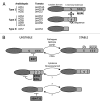Regulation of ethylene biosynthesis through protein degradation
- PMID: 22990452
- PMCID: PMC3548867
- DOI: 10.4161/psb.21930
Regulation of ethylene biosynthesis through protein degradation
Abstract
The function of hormones during plant growth, development and response to environmental stresses relies heavily upon the actions of the ubiquitin proteasome system (UPS), which selectively degrades numerous proteins. Synthesis of ethylene, a growth and stress hormone, is regulated in part by the ubiquitin-dependent degradation of the rate-limiting enzymatic protein aminocyclopropane-1-carboxylic acid synthase (ACS). Regulation of ACS protein stability, and therefore ethylene production, is mediated by non-catalytic sequences within the C-terminal extension of many ACS proteins. In this review we provide a brief overview of the E3 ligases that target ACS proteins for degradation and discuss how post-translational modification of the C-terminal extensions influence protein stability.
Keywords: ETO1; XBAT32; aminocyclopropane-1-carboxylic acid synthase; ethylene; phosphorylation; proteasome; ubiquitin.
Figures

References
-
- Argueso CT, Hansen M, Kieber JJ. Regulation of ethylene biosynthesis. J Plant growth 2007; 26:92–105.
-
- Yang SF, Hoffman NE. Ethylene biosynthesis and its regulation in higher plants. Annu Rev Plant Physiol. 1984;35:155–89. doi: 10.1146/annurev.pp.35.060184.001103. - DOI
Publication types
MeSH terms
Substances
LinkOut - more resources
Full Text Sources
